人教版英语八年级下册第一单元知识点总结
最全面人教版八年级下册英语第一单元知识点归纳总结
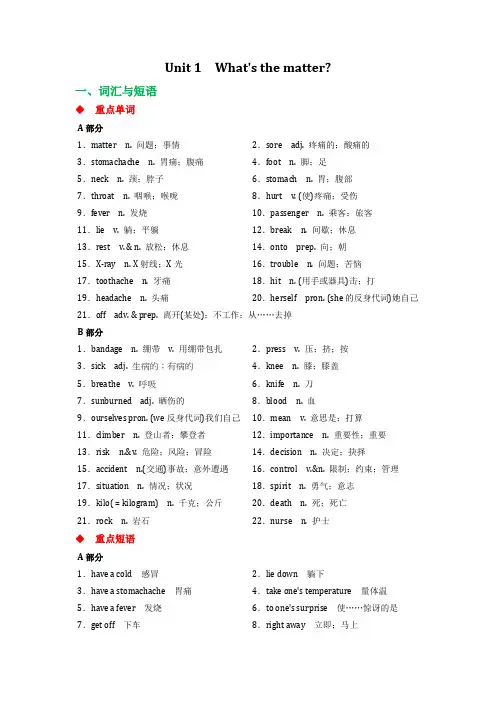
Unit 1 What's the matter?一、词汇与短语◆重点单词A部分1.matter n. 问题;事情2.sore adj. 疼痛的;酸痛的3.stomachache n. 胃痛;腹痛4.foot n. 脚;足5.neck n. 颈;脖子6.stomach n. 胃;腹部7.throat n. 咽喉;喉咙8.hurt v. (使)疼痛;受伤9.fever n. 发烧10.passenger n. 乘客;旅客11.lie v. 躺;平躺12.break n. 间歇;休息13.rest v. &n. 放松;休息14.onto prep. 向;朝15.X-ray n. X射线;X光16.trouble n. 问题;苦恼17.toothache n. 牙痛18.hit n. (用手或器具)击;打19.headache n. 头痛20.herself pron. (she的反身代词)她自己21.off adv. & prep. 离开(某处);不工作;从……去掉B部分1.bandage n. 绷带v. 用绷带包扎2.press v. 压;挤;按3.sick adj. 生病的;有病的4.knee n. 膝;膝盖5.breathe v. 呼吸6.knife n. 刀7.sunburned adj. 晒伤的8.blood n. 血9.ourselves pron. (we反身代词)我们自己10.mean v. 意思是;打算11.climber n. 登山者;攀登者12.importance n. 重要性;重要13.risk n.&v. 危险;风险;冒险14.decision n. 决定;抉择15.accident n.(交通)事故;意外遭遇16.control v.&n. 限制;约束;管理17.situation n. 情况;状况18.spirit n. 勇气;意志19.kilo( = kilogram) n. 千克;公斤20.death n. 死;死亡21.rock n. 岩石22.nurse n. 护士◆重点短语A部分1.have a cold 感冒2.lie down 躺下3.have a stomachache 胃痛4.take one's temperature 量体温5.have a fever 发烧6.to one's surprise 使……惊讶的是7.get off 下车8.right away 立即;马上9.take breaks (take a break) 休息10.talk too much 说得太多11.drink enough water 喝足够的水12.have a very sore throat 嗓子非常疼13.get an X-ray 拍X光片14.see a dentist 看牙医15.drink some hot tea with honey 喝一些加蜂蜜的热茶16.put some medicine on sth.在……上面敷一些药17.feel very hot 感到很热18.sound like 听起来像19.all weekend 整个周末20.in the same way 以同样的方式21.go to a doctor 看医生22.go along 沿着……走23.on the side of the road 在马路边24.shout for help 大声呼救25.without thinking twice 没有多想26.have a heart problem 有心脏病27.thanks to 多亏了;由于28.in time 及时29.save a life 挽救生命30.get into trouble 陷入麻烦31.hurt oneself 受伤32.fall down落下;摔倒B部分1.be used to 习惯于……;适应于……2.in a difficult situation 在困境中3.take risks (take a risk) 冒险4.keep on doing sth. 继续(或坚持)做某事5.run out (of) 用尽;耗尽6.make a decision 作出决定7.cut off 切除8.get hit on the head 撞到头部9.get out of 离开;从……岀来10.be interested in 对……感兴趣11.give up 放弃12.mean doing sth. 意味着做某事13.put a bandage on sth. 用绷带包扎…14.lose one's life 失去生命15.feel sick 感到恶心16.mountain climbing 登山运动17.have problems breathing 呼吸困难18.be in control of 掌管;管理◆重点句子A部分1.What's the matter with you?=What's the trouble with you?=What's wrong with you?你怎么了?2.What should she do? 她该怎么办呢?3.Did you fall down? 你跌倒了吗?4.Should I take my temperature? 我应该量一下体温吗?5.I think I sat in the same way for too long without moving.我想我以同样的姿势一动不动地坐得太久了。
人教版八年级英语下册Unit1知识点归纳
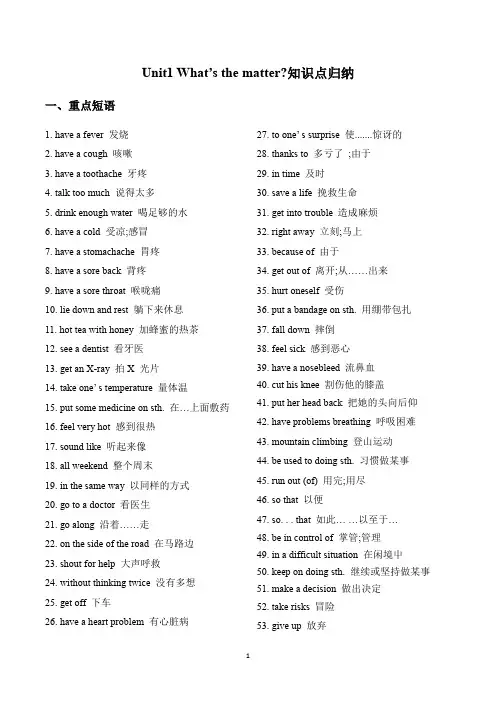
Unit1 What’s the matter?知识点归纳一、重点短语1. have a fever 发烧2. have a cough 咳嗽3. have a toothache 牙疼4. talk too much 说得太多5. drink enough water 喝足够的水6. have a cold 受凉;感冒7. have a stomachache 胃疼8. have a sore back 背疼9. have a sore throat 喉咙痛10. lie down and rest 躺下来休息11. hot tea with honey 加蜂蜜的热茶12. see a dentist 看牙医13. get an X-ray 拍X 光片14. take one’ s temperature 量体温15. put some medicine on sth. 在…上面敷药16. feel very hot 感到很热17. sound like 听起来像18. all weekend 整个周末19. in the same way 以同样的方式20. go to a doctor 看医生21. go along 沿着……走22. on the side of the road 在马路边23. shout for help 大声呼救24. without thinking twice 没有多想25. get off 下车26. have a heart problem 有心脏病27. to one’ s surprise 使.......惊讶的28. thanks to 多亏了;由于29. in time 及时30. save a life 挽救生命31. get into trouble 造成麻烦32. right away 立刻;马上33. because of 由于34. get out of 离开;从……出来35. hurt oneself 受伤36. put a bandage on sth. 用绷带包扎37. fall down 摔倒38. feel sick 感到恶心39. have a nosebleed 流鼻血40. cut his knee 割伤他的膝盖41. put her head back 把她的头向后仰42. have problems breathing 呼吸困难43. mountain climbing 登山运动44. be used to doing sth. 习惯做某事45. run out (of) 用完;用尽46. so that 以便47. so. . . that 如此… …以至于…48. be in control of 掌管;管理49. in a difficult situation 在闲境屮50. keep on doing sth. 继续或坚持做某事51. make a decision 做出决定52. take risks 冒险53. give up 放弃二、用法归纳1.need to do sth.需要去做某事2.see sb. doing sth.看见某人正在做某事3.ask sb. sth.询问某人某事4.expect sb. to do sth.期望某人做某事5.agree to do sth.同意做某事6.help sb. ( to ) do sth.帮助某人做某事7.want to do sth.想要做某事8.tell sb. To do sth.告诉某人做某事9.have problems (in) doing sth.做某事有困难e sth. To do sth. 用某物去做某事11.be/get used to doing sth.习惯于做某事12.seem to do sth.好像做某事13.keep on doing sth.继续做某事14.mind doing sth.介意做某事三、重点句型1. What’ s the matter? 你怎么了?What’ s the matter with you? = What’s the trouble with you? = What’ s wrong with you?2. What should she do? 她该怎么办呢?Should I take my temperature? 我应该量一下体温吗?主语+ should/shouldn’t + 动词原形. ..①You should lie down and rest.你应该躺下休息一会儿。
最新人教版八年级英语下册第一单元知识点汇总

最新人教版八年级英语下册第一单元知识点汇总Unit 1 What’s the matter?一、基础知识1.我感冒了。
可以表达为I had a cold、catch a cold或have the flu。
have a fever表示发烧,have a cough表示咳嗽,have a stomachache或肚子疼表示胃疼,have a toothache表示牙疼,have a headache表示头疼。
2.将身体部位和ache(疼痛)结合起来构成新的复合词,如stomach+ache=stomachache,head+ache=headache,tooth+ache=toothache,back+ache=backache,表示相应的疼痛。
3.“怎么啦?出什么事情了?”可以表达为What’ s the matter。
也可以用What’ s the trouble with you?或What’ s wrong with you。
matter和trouble为名词,其前可加the或形容词性物主代词,而wrong是形容词不能加the。
用于询问某人有什么病或遇到什么麻烦、问题,其后跟询问对象时,与介词with连用,如What’s the matter with sb。
= What’s your trouble?= What’s up?= What happens to sb。
举例来说,当问到“What’s the matter with you?”时,回答可以是“I have a bad cold.”4.maybe表示“或许”,常用于句首,表示可能性,后加句子。
例如Maybe you are right。
may be是情态动词+be的结构,意为“可能,也许”,后加名词、代词或形容词。
例如He maybe angry。
sound like可以和名词、代词以及从句结合使用,如It sounds like you don’t know the truth.It sounds like a good idea。
新人教版八年级英语下册第一单元知识点
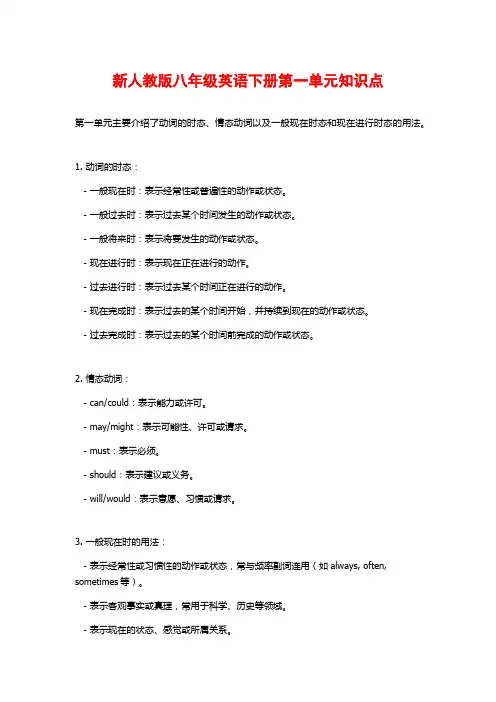
新人教版八年级英语下册第一单元知识点
第一单元主要介绍了动词的时态、情态动词以及一般现在时态和现在进行时态的用法。
1. 动词的时态:
- 一般现在时:表示经常性或普遍性的动作或状态。
- 一般过去时:表示过去某个时间发生的动作或状态。
- 一般将来时:表示将要发生的动作或状态。
- 现在进行时:表示现在正在进行的动作。
- 过去进行时:表示过去某个时间正在进行的动作。
- 现在完成时:表示过去的某个时间开始,并持续到现在的动作或状态。
- 过去完成时:表示过去的某个时间前完成的动作或状态。
2. 情态动词:
- can/could:表示能力或许可。
- may/might:表示可能性、许可或请求。
- must:表示必须。
- should:表示建议或义务。
- will/would:表示意愿、习惯或请求。
3. 一般现在时的用法:
- 表示经常性或习惯性的动作或状态,常与频率副词连用(如always, often, sometimes等)。
- 表示客观事实或真理,常用于科学、历史等领域。
- 表示现在的状态、感觉或所属关系。
4. 现在进行时的用法:
- 表示现阶段正在进行的动作或临时状态。
- 表示计划或安排的未来动作。
- 与always或often连用,表示经常性的不满或抱怨。
以上是第一单元的知识点,希望对你有帮助。
(完整版)新版人教版八年级英语下册第一单元重点知识点汇总
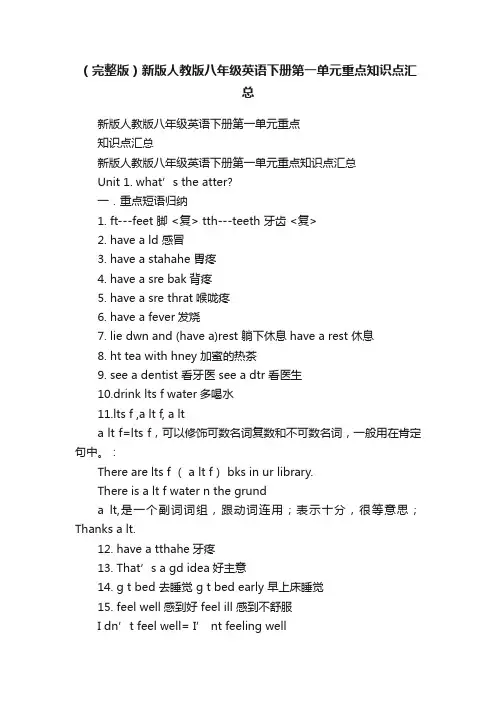
(完整版)新版人教版八年级英语下册第一单元重点知识点汇总新版人教版八年级英语下册第一单元重点知识点汇总新版人教版八年级英语下册第一单元重点知识点汇总Unit 1. what’s the atter?一.重点短语归纳1. ft---feet 脚 <复> tth---teeth 牙齿 <复>2. have a ld 感冒3. have a stahahe 胃疼4. have a sre bak背疼5. have a sre thrat喉咙疼6. have a fever发烧7. lie dwn and (have a)rest 躺下休息 have a rest 休息8. ht tea with hney 加蜜的热茶9. see a dentist 看牙医 see a dtr 看医生10.drink lts f water多喝水11.lts f ,a lt f, a lta lt f=lts f,可以修饰可数名词复数和不可数名词,一般用在肯定句中。
:There are lts f ( a lt f) bks in ur library.There is a lt f water n the grunda lt,是一个副词词组,跟动词连用;表示十分,很等意思;Thanks a lt.12. have a tthahe牙疼13. That’s a gd idea好主意14. g t bed 去睡觉 g t bed early 早上床睡觉15. feel well感到好 feel ill 感到不舒服I dn’t feel well=I’ nt feeling well我感觉不舒服.16. start ding/ t d sth开始做某事T D 是一件事情完成了,开始做另外一件事情DING是原的那件事情做到一半,现在又开始做了,是同一件事情。
17. tw days ag两天前18. get se rest 多休息, 休息一会儿19. I think s我认为是这样20. be thirsty口渴21. be hungry 饥饿22. be stressed ut紧张23. listen t usi听音乐24. healthy lifestyle健康的生活方式25. traditinal hinese dtrs传统中医26. need t d sth 需要做某事I have a tthahe. I need t see a dentist. 我牙痛, 我需要去看牙医.e need t keep ur lassr lean. 我们需要保持教室的干净.27. a balane f yin and yang阴阳平衡28. fr exaple例如29. t uh yin太多的阴, 阴气太盛t uh + 不可数名词太多的…uh t +形/副实在太…极其,非常t any + 可数名词复数太多的…30.be gd fr sth./ ding sth. 对什么有益,对什么有好处be bad fr sth./ ding sth. 对什么有害be gd t 对…好be gd at =d well in 在……方面好,擅长be gd(bad) fr、be gd at的相关用法1.be gd fr 对......有益Ding rning exerises is gd fr yur health.做早操对你们的建康有益。
人教版八年级英语下册第一单元知识点梳理汇总
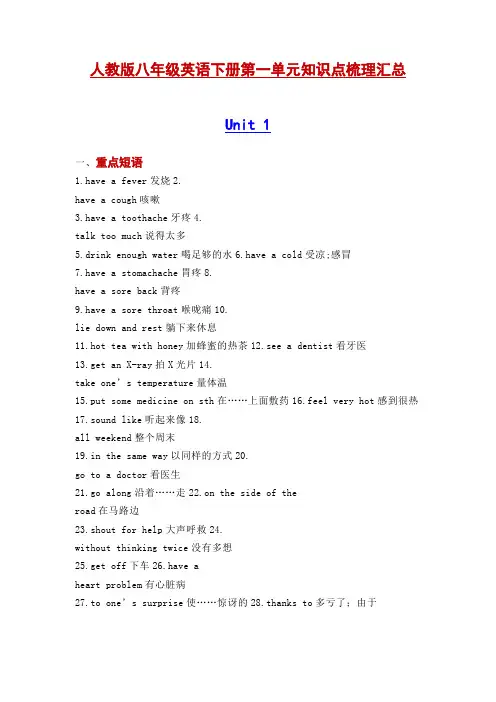
人教版八年级英语下册第一单元知识点梳理汇总Unit 1一、重点短语1.have a fever发烧2.have a cough咳嗽3.have a toothache牙疼4.talk too much说得太多5.drink enough water喝足够的水6.have a cold受凉;感冒7.have a stomachache胃疼8.have a sore back背疼9.have a sore throat喉咙痛10.lie down and rest躺下来休息11.hot tea with honey加蜂蜜的热茶12.see a dentist看牙医13.get an X-ray拍X光片14.take one’s temperature量体温15.put some medicine on sth在……上面敷药16.feel very hot感到很热17.sound like听起来像18.all weekend整个周末19.in the same way以同样的方式20.go to a doctor看医生21.go along沿着……走22.on the side of theroad在马路边23.shout for help大声呼救24.without thinking twice没有多想25.get off下车26.have aheart problem有心脏病27.to one’s surprise使……惊讶的28.thanks to多亏了;由于29.in time及时30.save a life挽救生命31.get into trouble造成麻烦32.right away立刻;马上33.because of由于34.get out of离开35.hurt oneself受伤36.put a bandage on sth.用绷带包扎37.fall down摔倒38.feel sick感到恶心39.have a nosebleed流鼻血40.cut his knee割伤他的膝盖41.put her head back把她的头向后仰42.have problems breathing呼吸困难43.mountain climbing登山运动44.be used to doing sth.习惯做某事45.run out(of)用完;用尽46.so that以便47.so…that如此……以至于……48.be in control of掌管;管理49.in a difficult situation在逆境屮50.keep on doing sth.坚持做某事51.make a decision做出决定52.take risks冒险53.give up放弃二、重点句型1.You need to take breaks away from the computer.你需要远离电脑,休息一下。
人教版八年级英语下册第一单元知识点汇总
人教版八年级英语下册第一单元知识点汇总Unit 1: Where did you go on vacation?第一单元:你去过哪里度假?I. Vocabulary(词汇)1. vacation (n.) - a period of time when you are not working or studying, especially one spent traveling or doing enjoyable things.(假期)2. destination (n.) - a place to which someone is going or where something is being sent or taken.(目的地)3. explore (v.) - to travel to a new place in order to learn about it or to search and discover new things.(探索)4. souvenir (n.) - something that you buy or keep to remind you of a special place or trip(纪念品)5. sightseeing (n.) - the activity of visiting interesting places, especially as tourists(观光)6. fascinating (adj.) - extremely interesting or attractive(迷人的)7. relaxing (adj.) - helping you to rest and become less anxious or tense (放松的)II. Grammar(语法)1. Simple Past Tense(一般过去时)- Used to talk about completed actions or events in the past.- Regular verbs: add -ed to the base form of the verb. Example: walked, talked.- Irregular verbs: do not follow the regular pattern. Example: went, ate.2. Adverbs of Frequency(频度副词)- Used to show how often something happens.- Examples: always, sometimes, often, rarely, never.III. Sentence Structure(句子结构)1. Questions with "Where"(带有"Where"的疑问句)- Used to ask about the location or place.- Example: Where did you go on vacation?2. Answers with "I went to..."(回答时使用"I went to...")- Used to respond to a question about where someone went on vacation.- Example: I went to the beach.IV. Communication(交际)1. Asking for and giving information(询问和提供信息)- Used to ask about and provide details of a vacation.- Example: A: Where did you go on vacation? B: I went to Paris.2. Expressing preferences(表达偏好)- Saying what you like or dislike about a vacation.- Example: I liked the food in Italy, but I didn't enjoy the crowded streets.V. Culture Corner(文化角落)1. Different types of vacations(不同类型的度假方式)- Beach vacation: spending time at the beach and enjoying the sun and sea.- Safari vacation: going on a wildlife adventure in natural reserves.- City vacation: exploring cities and visiting famous landmarks.- Mountain vacation: enjoying outdoor activities in mountainous regions.- Cultural vacation: immersing yourself in the local culture and traditions.总结:本单元主要学习了与度假相关的词汇以及过去式的用法。
人教版八年级下第一单元知识点总结
Unit 1 What’s the matter? 知识点总结一、基本知识点1. What’s the matter (with you)? 怎么了?出什么事了?What’s the trouble/ the problem / wrong with sb./ sth.?2. I had a cold.我感冒了。
have a cold=catch a cold=have the flu have a fever have a cough咳嗽have a stomachache胃疼,肚子疼have a toothache牙疼have a headache头疼3. 身体部位+ache(疼痛)构成新的复合词stomach+ache=stomachache head+ache=headache tooth+ache=toothacheback+ache=backache后背痛4. much too+ 词,意为,too much+ 词,意为。
5. enough【形容、副词】足够的/地,enough放在名前后,形副后。
good enough足够好,enough money=money money6. lie down躺下,lie 躺,躺着,过去式lay;lie说谎,过去式lied7. maybe “或许”,常用于句首,表示可能性,后加句子。
Maybe you are right.may be,是情态动词+be的结构,意为“可能,也许”,后加名词、代词或形容词。
He may be angry.8.sound like+名词代词和从句:It sounds like you don’t know the truth.It sounds like a good idea.sound+形容词,“听起来,好像”,The music sounds nice.9. need 需要,实义动词need+名词,需要某物;need to do sth.需要做某事,主语通常是人,表示人主动的动作:You need to listen carefully during class.need doing sth.主语通常是物,表示被动的动作:Your dirty clothes need washing.10. get off (the bus) 下(公交车)get on 上车11. agree 同意,赞同;同意做某事,同意某人的看法、观点12. trouble问题,麻烦;be in trouble ,maketrouble ,have trouble (in) doing sth. =have difficulties (in) doingsth 。
八年级人教版英语下册unit1知识点总结
八年级人教版英语下册unit1知识点总结Unit1是八年级英语下册的第一单元,主要围绕“the sentence”这一主题展开。
在学习中,我们需要掌握一些重要的知识点,本文将对这些知识点进行总结。
一、句子的构成句子是表达完整意义的语言单位,主要由主语、谓语和宾语三部分构成。
其中,主语是句子的主要话题或动作的执行者,通常位于句子的最前面;谓语是句子的核心,描述主语的动作或状态;宾语是句子的补充说明,通常位于谓语之后。
句子的构成还包括句子成分和句子成分的分类。
句子成分包括主语、谓语、宾语、表语、定语和状语等。
句子成分的分类主要有三种,即主谓结构、主、谓、宾结构和主系表结构。
二、句子的种类英语中根据句子的用途和表达方式,可以分为陈述句、疑问句、祈使句和感叹句四种。
其中,陈述句用来陈述事实、肯定或否定某种情况,一般语序为主谓宾,常以句号结尾;疑问句用来询问问题,通常以问号结尾;祈使句用来表达请求、命令或建议等语气,通常省略主语,以动词原形开头;感叹句用来表达强烈的情感,常以感叹词或how引导。
三、句子的语态和时态英语中的语态有两种,即主动语态和被动语态。
主动语态表示主语执行动作,而被动语态则表示主语受到动作的影响。
时态是句子非常重要的一部分,用来表示动作发生的时间。
英语中时态主要有现在时、过去时和将来时三种。
其中,现在时表示现在或经常性的动作;过去时表示过去发生的动作;将来时表示将来要发生的动作。
四、句子的修辞手法修辞手法是指用以增强语言表现力的一些技巧或方法,英语中常见的修辞手法包括比喻、拟人、排比、反问、设问、修饰语等。
其中,比喻是常用的一种修辞手法,用来通过两个事物之间的共性来形象地说明某一现象或情况,增强语言的表现力。
拟人则是将非人事物或抽象物质化为人来进行描述,以增强表达的感染力。
以上是八年级人教版英语下册Unit1的知识点总结,希望能够对大家在学习中有所帮助。
人教版八年级下册英语第一单元知识点
人教版英语八年级下Unit 1 What’s the matter一、重点单词及用法1.foot-feet 单复数的考察常用复数同:tooth-teetheg:Look,my f_____ are very big,but the new shoes are so small.2.stomach 变复数词尾直接+s stomachseg:The children can’t eat too much ice-cream because it’s bad for their s_______.3.X-ray 冠词考察无特指情况下用an X-ray4.lie躺-lay(过去式)-lying(现在分词)躺 lie down 躺下eg:They are _______(lie)on the beach and having a good time5.passenger 乘客复数passengerseg:There were ten __________ on the bus at that time.6.bandage n.绷带v.用绷带包扎eg:Can you put the bandage on the cut(改为同义句)Can you _________ yourself7.Kilo 复数kiloseg:How many ______ of tomatoes do you want8.knife 复数kniveseg:Don’t play with may cut your fingers.9.death n.死亡 die v.死亡-died(过去式)-dying(现在分词)dead (形容词死亡的)eg:The dog’s ______ made him very sad.10.sick 生病的既可以作表语又可以做定语 be sick =be illeg:We are going to visit _______ children in hospital.二、重点短语have a cold =catch a cold =have the flu 感冒 cough 咳嗽lie down 躺下take one’s temperature 量体温 have a fever 发烧take/have breaks/a break 休息=take/have a rest get off 下车-get on 上车to one’s surprise 令某人惊讶的是 right away 立刻马上=right nowget into (trouble)陷入(麻烦) get sunburned 被晒伤be used to (doing)习惯于适应于...... take risks/a risk 去冒险run out (of)用完用尽 cut off 切除get out of 离开从......出来 be in control of 掌管管理give up (doing)放弃(做)某事 have a stomachache 胃痛get an X-ray 做一个X射线检查 thanks to......由于多亏in time 及时 on time 准时 think about 考虑think of认为fall down 摔倒 make a decision 作决定put......on......把....放在...上 be interested in 对...感兴趣三、用法总结1.need to do sth需要做某事eg: The teacher needs_____(rest) for a few minutes.like 意为“听起来像”后接n./adj./句子eg: It sounds like a good idea.类似的感官动词+like:feel like/smell like/ look like/taste like/seem likesound+adj. 结构中,sound 是系动词意为“听起来是”后接形容词eg: That sounds great.+n./doing(v.现在分词) He went to school without having breakfast.eg:He left the classroom without ________ anythingv.同意,赞成agree with sb/某人的意见看法 Does she agree with usagree to do sth 同意做某事 They agreed to solve the problem. problems (in) doing sth做某事有困难=have trouble/difficulty (in) doinghave problems with sth =have trouble/difficulty with sth 在某方面有困难eg:One of my good friends said he had problems__________(learn) English. get used to doing sth 习惯于做某事eg:He used to get up late,but now he is used to getting up early.used to do sth 过去常常做某事(现在不做了)eg:He used to read English in the evening.use sth to do sth 使用用某物做某事eg:So he used knife to cut off his arm.be used to do sth 被动被用于做某事eg:These new pens are used to paint the wall.one’s life 丧失生命 save one’s life 挽救某人的生命eg:He lost his life in the car accident.adj.足够的充足的后接名词n. enough moneyadv.足够地修饰形容词/副词 enough要后置eg:The book is_______,but I don’t have enough money ______it.interesting; to buy enough; to buyenough; buying interesting; buying9. the importance of (doing)sth (做)某事的重要性important adj.重要的 unimportant adj.不重要的 importance n.重要性eg:We students should know the importance of (learning)English. n.决定 make a decision (to do sth)decide to do sth 决定做某事 decide not to do sth 决定不做某事eg:Tom made a decision to study English well.up 放弃give up 是动词+副词结构接代词作宾语时代词放中间eg:The problem is so difficult for you,but don’t _______A.give it up it out up it out itgive up doing sth 放弃做某事eg:You will be very sad if you give up______(sing).用法keep on doing sth 继续做某事(中间有间隔强调重复性)eg:He kept on studying though he was very tired.keep doing sth 继续不停地做某事(不间断连续性)eg:Keep walking until you reach the end of the road.keep sb doing 让某人一直做某事eg:Don’t keep the other students waiting.keep sb from doing sth 阻止某人做某事eg:We should keep the little boy from stepping on the grass.用法find找到,强调寻找的结果 look for强调寻找过程 find out找出查明eg:I was looking for my watch,but I didn’t find it.find sb doing sth 发现某人正在做某事eg:When I walked along the road,I found an old man shouting for help.find it +adj形容词+to do sth 发现做某事是...的eg:She found it hard to finish the work by herself.risks=take a risk 冒险 He likes taking risks.risk one’s life to do 冒着生命危险去做某事eg:He risked his life to save the child.risk doing stheg: The man called Tom often risks flying over the sea.四、短语辨析1.see sb doing sth 看见某人正在做某事(动作正在发生)see sb do sth 看见某人做某事(看到动作全过程或者经常看到动作发生)eg:I saw the boy crying when I passed by(路过).类似的 hear/watch/notice/find+sb do/doing sththanks to 多亏... 由于....=with the help of/with one’s help=because ofthanks for 因.......而感谢强调感谢的原因eg:Thanks to my teacher ,I passed the exam.Thanks for your help .Thanks for inviting me.2.in time 及时表示动作在规定时间内或比规定时间提前发生on time 准时按时指正好在规定时间内eg:Thanks for coming here to help me in time.The train arrived into the station on time.火车准时进站了。
- 1、下载文档前请自行甄别文档内容的完整性,平台不提供额外的编辑、内容补充、找答案等附加服务。
- 2、"仅部分预览"的文档,不可在线预览部分如存在完整性等问题,可反馈申请退款(可完整预览的文档不适用该条件!)。
- 3、如文档侵犯您的权益,请联系客服反馈,我们会尽快为您处理(人工客服工作时间:9:00-18:30)。
人教版英语八年级下册第一单元知识点Uni t 1 What’s the matter?【单词】∙matter /'mætə/ n. 问题; 事情What’s the matter(with sb.)?怎么啦?出什么事情了?询问有什么病或遇到什么麻烦、问题∙sore /sɔ:/ adj. 疼痛的,酸痛的;恼怒的--have a sore back 后背痛--sore throat咽喉痛n. 溃疡,痛处;恨事pressure sore褥疮,sore spot 伤疤,痛处;伤心事,旧疮疤∙stomachache ['stʌməkeɪk] n. 胃痛; 腹痛∙stomach /'stʌmək/ n.胃; 腹部∙foot /fʊt/ n. 脚; 足pl. feet-- on foot步行;在进行中-- at the foot of在…(山)脚下;在…的下部∙neck /nek/ n.颈; 脖子--necklace项链-- necktie领带--neck and neck (with sb.) (与…)并驾齐驱,不分上下∙throat /θrəʊt/ n. 咽喉; 喉咙∙fever /'fi:və/ n. 发烧 have a fever 发烧∙lie /laɪ/ -- vi. 躺, 平躺;位于,存在lie down 躺下--vi. 说谎,作为不及物动词的变化:p.pr -- lying,pt-- lied,pp—lied--vt. 下蛋;放置 e.g., The hen stopped laying eggs. She laid the baby down gently on the bed.作为及物动词是的变化:p.pr -- laying,pt-- lay,pp—lain∙rest v.& n. 放松; 休息∙cough n.& v.咳嗽∙X-ray n. X射线; X光∙toothache /'tu:θeɪk/ n. 牙痛∙temperature 温度,体温 take one' s temperature 量体温∙headache /'hedeɪk/ n. 头痛∙break /breɪk/ n. 间歇; 休息take breaks (take a break) 休息vi. vt.pt--broke,pp—broken--break away (from) 脱离,放弃(习惯),打破(陈套)--break down (机器等)坏了;(计划等)失败;(健康等)变坏;感情失去控制--break in 插嘴,使驯服--break into 破门而入,突然。
起来--break off 折断,突然停止讲话,解除(婚约)--break out(战争,火灾,疾病)突然发生,爆发∙hurt /hɜ:t/ v.(使)疼痛; (使)受伤p.pr -- hurting,pt-- hurt,pp—hurt∙passenger /'pæsɪndʒə/ n.乘客; 旅客∙off adv.& prep. 离开(某处); 不工作; 从......去掉 get off 下车∙onto /'ɒntʊ/ prep. 向; 朝∙enough [ɪ'nʌf] adj. adv. 足够的/地,充足的/地-- 用作adj.,修饰名词,可前可后enough water-- 用作adv.,修饰形容词或副词,要后置 old enough-- enough + for sb./sth+ to do sth. 足够…,能做…∙trouble /'trʌbl/ n.问题; 苦恼pl. troubles--in trouble 在监禁中;处于不幸中;处困难中--get into trouble 使自己或他人陷入困扰之境--have trouble(with … / doing sth. ) 在...有困难∙hit /hɪt/ v. (hit) (用手或器具)击; 打p.pr -- hitting,pt-- hit,pp—hit ∙herself /hɜ:'self/ pron.(she的反身代词) 她自己∙ourselves /'aʊə'selvz/ pron. (we的反身代词) 我们自己∙bandage /'bændɪdʒ/ n.绷带v.用绷带包扎∙sick /sɪk/ adj. 生病的; 有病的∙knee /ni:/ n.膝; 膝盖∙nosebleed /'noʊzbli:d/ n.鼻出血∙bleed [blid] vt. 使出血;榨取vi.流血;渗出;悲痛p.pr -- bleeding,pt-- bled [blɛd],pp—bled bled adj. 流血的;∙breathe /bri:ð/ v. 呼吸p.pr -- breathing,pt-- breathed,pp—breathed∙breath [brɛθ] n.呼吸,气息--deep breath深呼吸--take a deep breath深呼吸--out of breath喘不过气来,上气不接下气∙sunburned adj. 晒伤的∙climber ['klaɪmɚ] n. 登山者; 攀登者∙risk n. & v. 危险; 风险; 冒险--take risks (take a risk) 冒险∙accident /'æksɪdənt/ n. (交通)事故; 意外遭遇-- traffic accident交通事故-- car accident车祸;交通事故-- by accident偶然;意外地∙situation /'sɪtjʊ'eɪʃən/ n. 情况; 状况∙kilo (=kilogram) n.千克; 公斤kg千克 km=kilometer千米∙rock /rɒk/ n.岩石∙knife /naɪf/ n.刀pl. knives∙blood /blʌd/ n. 血∙mean /mi:n/ v. (meant) 意思是; 打算; 意欲p.pr -- meaning,pt-- meant,pp—meant∙importance /ɪm'pɔ:təns/ n. 重要性; 重要∙decision /dɪ'sɪʒən/ n. 决定; 抉择∙control v. 限制; 约束; 管理; 控制be in control of 掌管; 管理p.pr -- controlling,pt-- controlled,pp-- controlled∙advice [ədˈvaɪs] 不可数名词.-- give sb. advice on sth.就某事给某人建议;-- take sb’s advice接受某人的建议advise [əd'vaɪz] v.--advise sb. to do sth. 建议某人做某事,此动词不定式作宾语补足语。
-- advise doing sth 建议做某事相似用法的动词:allow(允许),permit(允许),forbid(禁止)等∙allow doing sth 允许做某事,allow sb to do sth 允许某人做某事;∙permit doing sth 允许做某事,permit sb to do sth 允许某人做某事;∙forbid doing sth 禁止做某事,forbid sb to do sth 禁止某人做某事。
eg.We don’t allow smoking in the lab.我们不准在实验室吸烟。
We don’t allow people to smoke in the lab.我们不准人们在实验室吸烟。
People are not allowed to smoke in the lab. 人们不准在实验室吸烟。
∙spirit /'spɪrɪt/ n. 勇气; 意志; 精神; 酒精∙death /deθ/ n.死; 死亡∙nurse /nɜ:s/ n. 护士∙Judy /'dʒu:dɪ/ 朱迪(女名)∙Nancy /'nænsɪ/ 南希(女名)∙Mandy /'mænde/曼迪(女名)∙Aron /'eərən/ 阿伦·罗尔斯顿∙Utah /'ju:tɑ:/犹他州(美国)【动词短语】∙have a sore back 后背痛have a stomachache 胃痛、肚子痛have a very sore throat 喉咙非常痛∙have a fever 发高烧∙feel very hot 感到很热∙have / catch a cold 受凉;感冒∙have a cough 咳嗽∙have a toothache 牙疼∙talk too much 说得太多∙drink enough water 喝足够的水∙cut myself 划伤自己∙hurt oneself 伤着自己∙have a nosebleed 流鼻血∙have a rest/take breaks/take a break 休息一下∙ a sick man 一个生病的人feel sick 感到恶心人教版英语八年级下册第一单元知识点总结∙have a heart problem有心脏病∙on the side of the road 在马路边, 在公路的一侧∙go along 沿着……走∙because of 由于∙get out of 离开; 从……出来∙mountain climbing 登山运动∙ in a difficult situation 在困境中∙save a life, save one’s life挽救生命∙shout for help 大声求救∙see a dentist = go to a dentist 看牙医∙see a doctor = go to a doctor 看医生∙drink enough water 喝足够的水∙lie down and rest 躺下来休息∙run it under water 在水下冲,用水冲∙get off 下车get on the bus 上公交车catch the bus 赶公交车∙get out of 从…出来get over( 克服)get on/ along well with sb. 和某人相处得好,get back 取回∙hot tea with honey带蜂蜜的热茶∙get an X-ray 拍X光∙put some medicine on it 敷一些药∙put a bandage on sth. 用绷带包扎∙take breaks away from…远离…休息∙without moving 没有移动∙in the same way 以同样的方式∙run out of 用完∙sth. run out. 某物用尽了。
